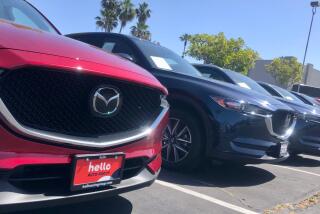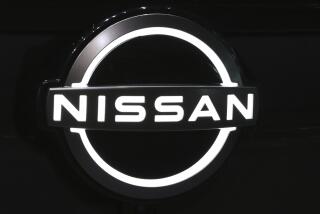Air-Bag Repair Scams Putting Unwary at Risk
- Share via
Drivers beware. Are those real air bags in your vehicle, or are they fakes?
Next time you consider buying a used vehicle or have to replace your air bags after a collision, make sure the safety restraint system you are relying on to save your life is genuine.
Dangerous air-bag repair scams are on the rise, insurance experts warn. Some disreputable auto repair shops are installing dummy or fake air bags to save money--sometimes at the request of customers who plan to resell the damaged vehicle to an unsuspecting buyer.
Although it is legal to use recycled or salvaged air bags as replacements after an accident or theft, it is, of course, illegal in California to dupe unwitting consumers by installing fakes that offer no protection and endanger lives.
The California law, the first in the country, makes installing a fake air bag a misdemeanor punishable by a $5,000 fine and a year in jail. A few other states are looking into enacting similar laws.
Supplemental Restraint Specialists, which conducts investigations for insurance companies and attorneys, has documented scores of cases of phony air bags.
“About one out of 25 air bags tested are fake air bags,” said Tom Foresta, production manager at the Long Beach company.
Instead of finding an air bag behind the safety restraint cover, investigators and mechanics are finding rags, paper, sticks, tennis shoes and old clothing stuffed in the steering column, Foresta said.
*
It is particularly disturbing to learn that motorists who have had collisions are conspiring with disreputable shops, said Kim Hazelbaker, senior vice president of the Insurance Institute for Highway Safety, a nonprofit research group funded by insurance companies.
“What we think is happening,” Hazelbaker said, “is that some people who have older vehicles with air bags are probably not carrying collision insurance anymore because the vehicles are not of sufficient value to carry it.”
So to save the out-of-pocket costs of a legitimate replacement--$600 or more--some motorists are opting for fake air-bag covers that make it appear as if there is a working air bag in the vehicle, he said. The owner then resells the car, leaving the buyer none the wiser.
Another reported scam concerns disreputable repair shops charging customers for new air bags when, in fact, they simply stuff the steering column with junk.
“This is a highly dangerous practice,” said Peter Byrne, president of Airbag Testing Technology Inc. of Lakewood, N.Y.
Although this conduct comes from “an extremely small amount of the [repair] market, people’s lives are put at risk,” he said.
“Just think if you have a car crash and you have one of these dummy air bags in your steering column, unknown to you. The consequences could be severe injury or worse,” said Byrne, whose firm tests recycled air bags to determine if they should be certified for use in other vehicles.
The high cost of air bags has attracted “a criminal element into an otherwise legitimate business,” he said.
A pair of air bags from the manufacturer can cost $600 to $2,500 to replace, depending on the vehicle model. Recycled air bags can cost as little as $200.
The value of automobile air bags, whether new or recycled, has also contributed to a rise in thefts, insurance experts report.
“Over 10% of all automobile theft claims currently involve the theft of air bags,” Hazelbaker said.
State Farm Mutual Automobile Insurance Co., which covers about 20% of insured drivers in the United States, said it receives about 15,000 reports of stolen air bags a year.
Most insurance carriers won’t cover installation of a recycled air bag that was removed from another vehicle.
*
Are recycled air bags as safe as new ones from the manufacturer? It depends on who you listen to.
“I would not be afraid to put my kids behind one,” said Terry Fiskin, executive director of the Auto Dismantlers Assn. of Southern California.
If recycled air bags are extracted and properly labeled and sold by professional, responsible salvagers, he said, they make for safe, inexpensive replacements.
Research done two years ago by the Automotive Recyclers Assn. in Virginia found that as long as they have not been underwater or tampered with, “there is nothing wrong with recycled air bags,” Fiskin said.
Of the 196 salvaged air bags that the association tested, all functioned properly except for one that had sustained flood damage.
The important thing is that the recycled bag be the manufacturer-approved system for the specific vehicle in which it is being installed, said Byrne of Airbag Testing Technology.
Despite such assurances, not all experts are convinced of the safety of recycled air bags.
“At this point, we don’t approve of recycled air bags being used,” said Steve Mazor, principal automotive engineer for the Automobile Club of Southern California. “There’s no way of knowing whether [they] will work properly.”
One concern is that the history of a recycled air bag cannot be traced, because there is no vehicle identification code on air bags, as there is on other auto parts.
If an air bag has been recovered from a vehicle that has been damaged in a flood or “totaled” during a rollover or frontal collision, the chances of it being safe for recycling are slim, Hazelbaker said, noting that “99% of those would have deployed bags.”
“From a safety standpoint, I would not use a recycled air bag in my vehicle,” said Ken Zion of Automotive Collision Consultants.
Because most insurance carriers won’t cover recycled restraint systems, new bags remain the safest choice, said Zion, whose Long Beach firm investigates auto repair work and conducts accident reconstruction for litigants.
“Quality repair shops recognized by insurance carriers are not going to be cutting corners on safety,” he said.
The Automotive Occupant Restraints Council urges vehicle owners to demand that only new air bags be used to replace deployed or stolen bags.
The council, a group of manufacturers of seat belts and air bags, has no statistics on how many recycled air bags have been installed in vehicles.
*
Unfortunately, it’s not easy to tell if your replacement air bag is a fake or otherwise damaged. Experts at the Insurance Institute for Highway Safety and the auto repair industry offer these tips:
* The only sure way to know is by removing the air-bag cover. But since you run the risk of popping the bag, have an experienced mechanic do it.
* If you are considering a used vehicle and its dashboard air-bag diagnostic light does not come on, or if you suspect that the vehicle has been in a collision, have it checked by a mechanic. The air bag, sensors and control module should be inspected.
* When replacing damaged or stolen air bags, insist on a receipt from the repair shop showing whether the replacements are from the manufacturer or a licensed dealership. If you are obtaining recycled air bags, make sure they are the proper type for your vehicle. Also ask where they came from.
*
Jeanne Wright cannot answer mail personally but responds in this column to automotive questions of general interest. Write to Your Wheels, Business Section, Los Angeles Times, 202 W. 1st St., Los Angeles, CA 90012. E-mail: jeanrite@aol.com.






